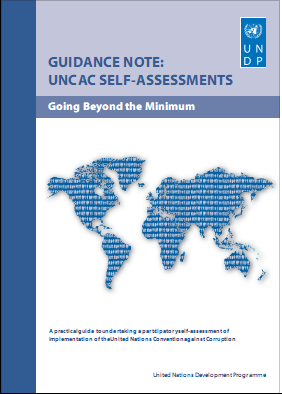
Dear Asia-Pacific INTACT Network members,
I’m pleased to share with you our new “Guidance Note: UNCAC
Self-Assessments – Going Beyond the Minimum”, a practical guide to
undertaking a participatory self-assessment of implementation of the United
Nations Convention against Corruption (UNCAC), published by the UNDP
Asia-Pacific Regional Centre in Bangkok in partnership with UNODC, GTZ, Basel
Institute on Governance (Switzerland) and Institute of Governance Studies, BRAC
University (Bangladesh).
The Guidance Note seeks to provide national stakeholders with a
methodology on how to conduct an UNCAC Self-Assessment, based on previous
country experiences, including in Indonesia and Bangladesh. In 2010, several
other countries have already followed suit by commencing participatory UNCAC
Self-Assessments, for example in Bhutan, Mongolia, and
Maldives.
As you know, the UNCAC Conference of the States Parties established a
mechanism to review implementation of the Convention last year. Over the next
ten years (2010-2020), every State party will be reviewed on its implementation
of the Convention. The first step in the Review Mechanism requires the State
party to undertake an UNCAC Self-Assessment by completing the UNCAC
Self-Assessment checklist, using specific software designed for this purpose.
Furthermore, States parties are encouraged to go beyond the minimum and to
prepare their responses to the comprehensive self-assessment checklist through
broad consultations at the national level with all relevant stakeholders,
the private sector, individuals and groups outside the public sector. This
Guidance Note provides clear guidance on how to undertake such a participatory
UNCAC Self-Assessment process.
As you may know, in 2010 the following countries in the Asia-Pacific
region are required to report under the UNCAC Review Mechanism: Bangladesh,
Fiji, Mongolia, and Papua New Guinea. By 2011 (Q3), Brunei Darussalam,
Indonesia, Iran, Lao PDR, Philippines, Sri Lanka, Timor-Leste, and Vietnam
need to submit their UNCAC Self-Assessment reports. By 2012, Afghanistan,
Cambodia, Malaysia, Pakistan, and the Republic of Korea; and by 2013:
China, Maldives, Palau, and Singapore.
As a participatory UNCAC Self-Assessment process takes at least 6
months to complete, this
Guidance Note provides
timely guidance for UNDP Country Offices, national stakeholders and partners in
countries that need to report in 2011, so they can begin the process in the
coming months and submit their UNCAC Self-Assessment reports in line with their
international obligations.
Every UNCAC Self-Assessment process is expected to provide an
opportunity for national dialogue on anti-corruption policies and programmes and
further stimulate progressive reforms at the national level to curb corruption
in the interest of sustainable and human development in the Asia-Pacific region
and beyond.
We stand ready to support you in this process!
Best
regards,
Pauline
|
Nov 3, 2010
